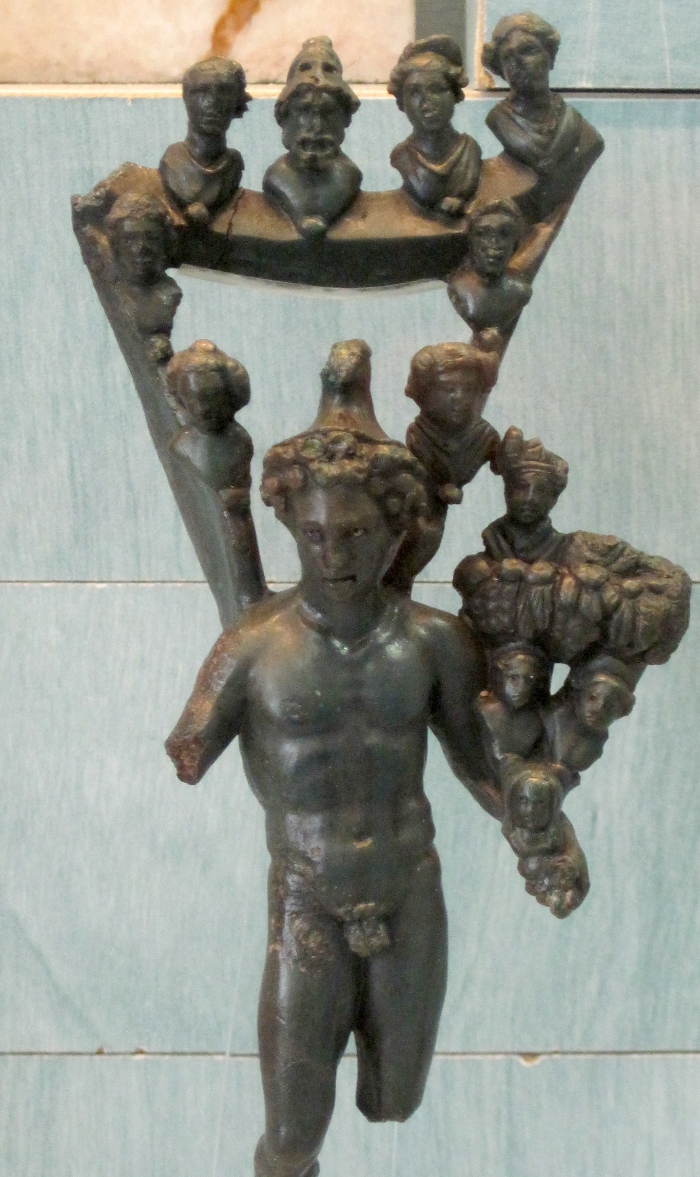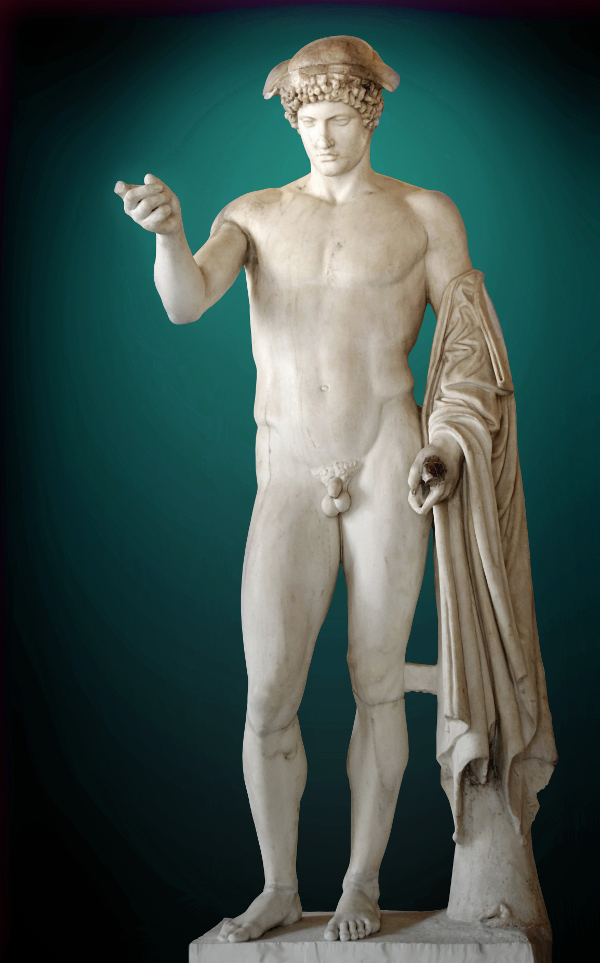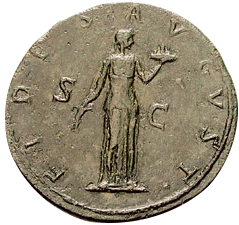NATURE OF THE GODS
Don’t expect to find any sort of creed on this page. To confuse religion with faith is one of the most serious errors inculcated by the Abrahamic religions. What the nature of the gods is is one of the greatest mysteries of the world. Still, the insights of Antiquity can give us a place to start from.
Cicero’s dialogue On the Nature of the GodsM. Tvllivs Cicero (c. 45 bce). Dé nátúrá deórum libri III. Latin text, English translation. is a useful embarkation point, since it summarizes the points of view of several philosophical schools at the same time (as they were in the mid-1st century bce, just before the campaigns of the divine Julius Cæsar). These are the Stoic, Epicurean, and Academic schools; the influences of Plato and Aristotle can be traced to some degree throughout, even though the Platonic and Peripatetic schools had nearly disappeared at that stage. Cicero’s approach is open-minded and frank; he admits doubts where he feels them and rejects dogmatism.One reason Cicero shows such hostility towards Epicureanism is the doctrinaire discourse of Epicurus and his disciples. On the whole, he prefers the theology of the Stoics because it seems the most agreeable to him, but he does not claim to have discovered therein the whole and only truth.
Some centuries later, Platonic philosophy was given a new start, notably by Plotinus; his successors, such as Iamblichus, went on to undertake a synthesis of the various schools of philosophy with popular religion, which was then menaced by the rise of Christianity. Iamblichus’ work On the Mysteries proceeds admirably in this direction, although the general reader may find it a bit long and complex. By contrast, Salustios’ little pamphlet On the Gods and the WorldSalustios the philosopher (4th century ce), Dé deís et mundó (Σαλούστιος, Περὶ Θεῶν καὶ Κόσμου). Greek text, English translation. The author’s identity is debated. He might be Secundus Salutius (a Gaul) or Flavius Sallustius (a Spaniard who was prætorian prefect of Gaul). Both were close to the divine Julian (Flavius Sallustius was one of his colleagues as consul, while the army tried to persuade Secundus Salutius to succeed Julian as emperor after the latter’s death). The ideas in this pamphlet doubtless were in circulation in Gaul, even if its language (Greek) cut down on the number of people who could read the text. has the virtue of clarity and simplicity: it was intended practically as a tract in defence of the Empire’s official return to ancient religion under the divine Julian.
Do the gods really exist?

Graphical representation of the Pythagorean triad.(Pseudo-?) Iamblichus, Theologumena arithmeticae (translated into English by Robin Waterfield as The Theology of Arithmetic, 1988), p. 49. Numbers, like gods, are both immanent and transcendent.
I would hardly be a polytheist if I didn’t reply in the affirmative! Actually, however, the Epicurean school offers a perspective in which the gods do not, so to speak, need to exist—we just carry on as though they do. For Epicurus, the gods’ only merit is to be happy and eternal. (Which ain’t nothing.) They are worshipped because piety is good for society and beneficial for the individual. (There are some similarities here to the pious agnosticism of Confucius.) A few ancient thinkers affirmed atheistic doctrines,They deserve credit for their courage, for atheism was by no means a popular position at the time. but most sceptics went no further than to deny the possibility of knowing anything definite about the nature of the gods.
The ‘proofs’ of the existences of the gods are wide-ranging and not terribly convincing. (The universe must have been designed by an intelligent power, all societies concur in the existence of godhead, the non-existence of gods would be inimical to public morals, etc. All three lines of these lines of argument can be found, for example, among the Stoics.)
The existence of a deity has, since Plato and the Neo-Platonists, been justified as a first cause or else derived from the One (the True, the Good). Numbers offer perhaps the clearest illustration of the nature of deities from a Platonic point of view. Everything in the world can be quantified: on my desk right now there is one figurine of an okapi whose body is symmetrical in two dimensions, with two ears, four legs, one tail, and so on. Numbers thus are immanent. However, they are not restricted to any given quantifiable phenomenon: three equals three, regardless of our okapis. Thanks to the equation 3 × 4 = 12, we can be sure that three okapis with four legs each must have twelve legs, but the equation is true intrinsically and eternally, without reference to okapis or any other external circumstance. Number is therefore transcendent as well as immanent. Gods are similar, in that their deeds and influence can be discerned everywhere in the phenomenal world, but they themselves transcend the world. They belong to a higher plane than existence itself.
Are deities distinct from one another?
All things desire the Good; all beings participate in the Good. Communication between the gods and the Good (the One, the True) must be close and constant, according to the Platonists. All divinities act in concert by reason of their shared accord with the Good. The Stoics for their part affirm the basic unity of the plan of the universe, in the framework of which the gods act as supreme guardians.

Mercury Pantheus. Bronze statuette from the Morvan: a depiction of the basic concurrence among the gods (here, it is Mercury that brings them together).
(Musée Rolin, Autun)
To say that the gods are ultimately united in purpose is by no means the same as claiming that they are all one indistinct mass. It’s a mistake to jumble together all goddesses into a single archetype (such as ‘triple goddess’ or ‘earth-mother’) or all gods into another (‘horned god’, ‘vegetation god’, or the like). This type of muddle stems from an early 20th-century intellectual current that is not only outdated but, to tell the truth, always was dubious and reductionist. It therefore falls to today’s polytheists to affirm the unique and distinct personhood of each deity. Venus is not Diana; Diana is not Juno, and so on. The spirit, energy, and inspiration that you will find with each of these goddesses are quite different. It makes no sense to invoke one in order to communicate with the other.
This doesn’t rule out the possibility of translating a deity’s name or identity in another cultural context (all the while admitting that translations are never perfect or definitive). Cultural differences, after all, belong to mortals and are no barrier to the gods. The gods, as Plutarch says, are common to all peoples just as the Sun and the air are.Plutarchus (c. 100 ce), De Iside et Serapide 67. Comparative mythology and theology can uncover parallels between deities belonging to different pantheons. The ancients did something rather similar wherever cultures came into contact with one another: thus the Greek Hermes is invariably called Mercury in Latin; Germanic peoples recognized the latter god in their Óðinn; the Greeks of Egypt identified him with Thoth, etc. This kind of theological ‘translation’ is called interpretátió.
Often we also encounter syncretism—that is, the phenomenon that occurs when the númina of two deities commingle, giving rise to a third divine personage who in some sense partakes of the natures of both. In Gaul, for instance, one important god has the name Silvanus and the attributes and characteristics of both the Italian Silvanus and the Celtic Sucellos. Our Gaulish Silvanus (who is called Sucelus Siluanus on the dedication of one altar-stoneCorpus Inscriptionum Latinarum (CIL) XIII: 6224.) thus joins the divine power and impact of his Italian and Gaulish forerunners without suppressing these (even if perchance he might surpass or even supplant them in his worshippers’ minds). Syncretism is similar (but not identical) to another phenomenon by which a figure is depicted with a deity’s traits in order to highlight a resemblance between them. The figure identified with the (generally better known) deity can be either another deityAntinoüs, for example, is often depicted as Bacchus, Osiris, Ganymede, etc.; Victoria–Brigantia was also depicted as Minerve. or a mortal.The empress Lucilla was depicted in her lifetime as Venus, Ceres, etc.
I’d like to point out an interesting case of both syncretism and interpretátió from a Gallo-Roman milieu. An educated person—probably a slave—named Tychicus wrote some verses at Pommern thanking Lenus Mars in Latin and Lenos Ares in Greek for having cured him of a disease.CIL XIII: 7661. Tychicus interprets Mars as Ares without difficulty (one might almost say without reflection) according to the language he’s using. However, we are dealing specifically with Lenus Mars, a god springing from syncretism between a Celtic *Lēnos and the classical Mars/Ares: this god is characteristic of the Treveran region, where he distinguishes himself from more ‘militant’ avatars of Mars by healing his worshippers at sanctuaries with sacred springs. (Even so, depictions of Lenus Mars follow classical norms...)
Do gods concern themselves with humankind?
This is a question that divides philosophers. The Stoics say yes; for them, all the useful things we find in the world around us bear witness to the providential goodness of the gods. The gods thus appear as benevolent guardians that continually offer us their aid (however little we might take them up on it!).
Epicureans, on the other hand, declare that the gods—sublime, self-reliant, and perfectly happy—do not trouble themselves with the fate of mortals. It’s up to us alone to make ourselves happy (by avoiding pain, for instance, or surrounding ourselves with friends and beautiful things).
In the view of Platonists like Plotinus, Proclus, or our old friend Salustios, the gods radiate beauty, order, and virtue because it is their nature to do so. We receive such benefits in the same way that we receive light and warmth from the Sun, even though the Sun does not specifically seek to benefit us. So it is with the (other) gods.
Other Platonists such as Iamblichus, deeply committed to theurgy, believed they could communicate with the gods and make them appear to them. High-minded theurgists aimed to elevate themselves to the transcendental level of the gods, rather than to sully the gods with material concerns. Others, such as Maximus (a companion of the divine Julian), differed little from magicians. A basic characteristic of sorcery is to claim to constrain the gods to appear and act in worldly affairs. The authors of défíxiónés (written spells, often curses) certainly must have believed in the active intervention of deities in everyday life.
Are the gods good?
Assuredly. Good people have nothing to fear from the gods; indeed, fear of the gods is a sure sign of superstition rather than religion. That distinction is crucial for philosophers and religious authorities, and these words do not mean quite the same thing as in general English usage. Réligió is the ensemble of practices that symbolically renew the primordial partnership existing between gods and mortals. By contrast, superstitió is precisely that “which involves a vain fear of the gods”, according to Cicero.M. Tvllivs Cicero, Dé nátúrá deórum I: 42: 117. Version originelle : in quá inest timor inánis deórum. A reasonable person who undertakes in good faith to honour the gods has nothing to fear ... and everything to gain.
The natural condition between gods and mortals is peace; the Romans called this the páx deórum. In honouring the gods, the soul is elevated so as to be able to receive their providential goods (such as courage, fortitude, and happiness). According to the Platonists, the gods bestow such goods without diminishing or exerting themselves for the simple reason that their nature is providential. They do not need us; we can offer them no service they require, for they are already perfect, self-sufficient, and impassive. Their power is infinite, to be sure, but they are not apt to be offended. If we pray to them, it is to partake of their beneficent essence.
Do gods communicate with mortals?
Yes, though we should be careful about accepting the authenticity of a purported divine sign.Cicero’s cautiousness in his work Dé díuínátióne is noteworthy. He maintains for example that the gods express themselves clearly; cryptical oracles are thus by definition of dubious authenticity. Interestingly, Cicero was himself an augur. A mortal might ordinarily expect to receive a clear and direct communication from a divine power, perhaps, several times a lifetime, but not every day. Some certainly apply themselves to developing close communications with the genii who protect them—this is notably the case with Socrates, whose genius is said to have continually aided him to improve himself.Plutarch dedicates a dialogue in his Moralia to Socrates’ genius (Dé genió Sócratis). English translation. Others with training and experience can develop their divinatory skills still further.

Mercury the orator: a Roman copy of the statue of Phidias depicting Hermes Logios, patron of communication.
(Modification of an image by Marie-Lan Nguyen, CC BY 2.5 licence)
In ancient times, the gods could communicate with mortals by means of a recognized code, so to speak. This code consisted of signs and prodigies whose ritual significance was interpreted by certified experts (uátés, augurés, haruspicés etc.). Priests and their assistants practised divination in a range of ways, many of which were also accessible to non-expert worshippers through handbooks or even public inscriptions.This is notably the case with the inscriptions in southern Asia Minor explaining how to interpret lots cast with astragaloi (the knucklebones of a sheep or other ruminant).
The gods can communicate perhaps most directly in dreams. There were once sanctuaries where pilgrims would go to sleep and hear the instructions of the gods who held sway there—perhaps after the pilgrims had drunk water from a mineral spring on site, or else a mixture brewed with henbane, vervain, or the like.
Do the gods really look the way their statues depict them?
It is rather that cult images are designed to resonate with the spirit of the deities they depict. We are embodied in a material reality; in order to conceive an idea of something, it’s simplest to visualize it. We teach children the idea of five by showing them five apples or five coins. The images of the gods serve more or less the same purpose: to make it easier for us to conceptualize what is transcendent. The image of Mercury, for example, brings to mind the god’s mythology and character. His caduceus and winged petasus signal his role as herald and guide of travellers; the purse signifies his presiding over prosperity and gains; the tortoise recalls a myth illustrating the god’s inventiveness and mischievousness.
But we are the ones who need symbols like this; the gods certainly do not need them in order to realize their full nature. Divine inspiration can help communicate which symbols will work best for us mortals; still, this must needs be filtered through the cultural context of an individual or community. The depictions of the gods vary enormously (for instance, among Greek, Egyptian, Indian, and Chinese traditions), but the gods themselves—at least according to the Platonists—are eternal and unchanging.
The philosophers certainly do not suppose that the gods really look the way they are depicted in one cultural tradition or another. In On the Mysteries, Iamblichus describes the various kinds of light and vapour that he says accompany dæmons, angels, and gods as they appear. The form of the gods, to the extent that they have any, is probably spherical. This at least is the shape of the ‘visible gods’—the stars and planets that the ancients identified as bodies of the gods (presumably their spirits transcend space). The soul, according to the Platonist Proclus, also takes the form of a sphere, which is why the head that encases it is roughly spherical. While the gods transcend the material plane, this does not mean that they are not present in it. As the Hindu sage Ramakrishna has it, a god can take form on or off just as we do with clothes.
Why do the gods permit the existence of evil?
One might as well ask why the Sun permits the existence of cold and darkness. The answer would be the same.
Goodness exists because we partake of the Good (that is, of godhead). Its opposite, evil, is merely the result of being distant from the Good. As physicists explain, cold strictly speaking does not exist—there is only the absence of heat. Pursuing the analogy, evil, too, has no positive existence. Certainly, the Holocaust, the Rwandan genocide, the sufferings of the Syrians, and a myriad of other daily tragedies are experienced as evil. But there is no use reproaching the gods for these things any more than the Sun should be blamed for not warming Pluto any more than it does. The farther one is from deity, the more susceptible one is to commit (and to feel) the evils of this world.
Such, at any rate, is the position of Neo-Platonic philosophers like Proclus and the excellent Salustios.
Poets, on the other hand, love to depict gods who are prone to anger. The ‘evil god’ is even a recurrent theme in magical writings. Personally, I’m not convinced that there can be any such thing. I will admit that a genius (or mundane deity) may act against the interests of some individual in pursuit of a higher good; this individual might well, in such a case, mistake opposition for ill will. As for the eternal gods, they are of course above the fray. According to the consensus of philosophers, the gods are exempt from passions of all kinds, the literary devices of poets notwithstanding.

Fides Augusta or ‘august Faith’, depicted on a sesterce of the divine Plotina.
(Modification of an image from the Classical Numismatic Group, Inc., CC BY-SA 3.0 licence)
Faith and belief
It is, as I said above, improper to define religion in terms of faith. Religion is the service that mortals render to the gods: Prayer. Hymns. Offerings. Pilgrimages. Service. Such activities bind worshippers closer to the gods, and at the same time weld groups of worshippers into a community. So it has always been; even the piety of Christians, Jews, Muslims, and Bahá’ís is expressed in the same ways.Michael York (2003), Pagan Theology, New York University Press. What constitutes religion is not belief, but piety; to contradict this plain and universal principle is to imbalance religion by making it stand or fall on the caprices of the individual mind. Christians torture themselves with such questions as, “Do I really believe? Do I believe hard enough?” The doubts that naturally arise from such questions, and others about the existence and nature of godhead, are felt by them as real crises. For us, they are pleasant academic discussions. Let us leave to the Christians, Muslims, and other ‘believers’ such baseless feelings of shame and guilt—even the actual fear of freely exercising their natural reason. (Let us not forget the Church’s efforts to block the scientific progress of Galileo, Buffon, or Darwin. A ‘believer’ is even said to have ordered the destruction of what remained of the Library of Alexandria on the grounds that no book was necessary save the Qur'ān.This is supposed to have been the Caliph Omar. However, the source of this story (Bar Hebraeus a.k.a. Abu’l Faraj) is late and its trustworthiness is debatable. Here is a discussion of the subject.)
On the other hand, Faith (Fidés) was by no means a value that the ancients rejected. On the contrary, defining Faith as ‘good faith’—the honour that obliges mortals to cleave to our commitments—the Greeks and Romans venerated her as a goddess (the feast-day of Fidés Pública was 1 October at Rome, where she was endowed with a temple). But faith in the Christian, Muslim, and Bahá’í sense of the term is essentially superstitió.
The gods cannot be seen—at least, not in the way we can see an expressway or a raven. Their nature is, to a great degree, hidden from our view. Let’s talk about this. It’ll do us good.
Notes

En français svp !

Auf deutsch, bitte!
